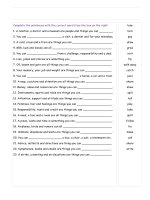islcollective worksheets preintermediate a2 intermediate b1 upperintermediate b2 high school reading writing future simp 1157681572549410f9db4a66 42807693
Bạn đang xem bản rút gọn của tài liệu. Xem và tải ngay bản đầy đủ của tài liệu tại đây (368.74 KB, 2 trang )
It’s nearly that time of the year again when you can turn over a new leaf, start from scratch, or just
try and be a little bit better in 2015. Millions of people all over the world will be making New
Year’s Resolutions.
New Year’s Resolutions Are Bad for You
Everyone has a mental list of habits they would like to change,
and the New Year seems like a perfect time to start. “New Year, new
you” is a phrase you will see repeated in print. But this is just singsong
rhetoric. Just because it sounds right to your ear does not mean that it
contains any meaningful truth. The year will certainly change, but you
will likely be the same person on Jan. 1, 2015, that you were on Dec. 31,
2014.
The statistics are bleak: only 8% of people who make New
Year’s resolutions stick to them, and those who don’t usually abandon
them after just one week. Unrealistic resolutions are fated to fail. And it
is unrealistic to think that you can immediately overcome a habit you
have spent years establishing. But is this necessarily harmful? There’s a
good chance that it is. If your New Year’s resolution is to eat less, but
you have no plan in place — or even if you do have a plan and you fail
— you will do damage to your sense of self-worth. If you already have a
complicated relationship with food, your likely coping mechanism for
failure is eating more food. Thus the New Year’s resolution to eat less
can actually result in your eating more. The same can happen with
drinking, drug use, smoking, finding a mate, exercising, etc.
The practice of making resolutions itself dates back to ancient Babylon,
who made promises to their gods for the New Year, often having to do
with concrete, easily achievable tasks. Now promises are made to
ourselves and are primarily psychological in nature. When you tie your
behavioral change to a specific date, you rob yourself of an opportunity
to fail and recover, to “fail better.” If you believe that you can only
change on the New Year, you will have to wait a whole year before you
get another shot.
Just the act of making a resolution can make you feel
temporarily better, enough that it obviates further action. Steve
Salerno, author of Sham: How the Self-Help Movement Made America
Helpless, says, “Do we all not know people who make the same
resolutions year after year? Or maybe we are that person.
My concern is that the resolution takes the place of the action,
as is also true with so many millions of people who sign up for an
endless succession of self-help programs: They think some magic words,
some promise, will magically transform their lives, when we all know
that the real transformational work is tough,, and usually involves
sacrifice and unpleasant choices.”
Here’s a better idea. Instead of listing an abstract
goal like “lose weight,” think of specific small steps
you can take, every day, that will have the same
result. If you fail at any of these small steps —
which you inevitably will — brush it off, and
realize that failure and recovery is part of any
process.
www.ideas.time.com
By Jessica Lamb-Shapiro (abridged and adapted)
Top 10 Commonly Broken New Year's
Resolutions
•
•
•
•
•
Lose Weight and Get Fit
Quit Smoking
Learn Something New
Eat Healthier and Diet
Get Out of Debt and Save
Money
•
Spend More Time with
Family
•
Travel to New Places
•
Be Less Stressed
•
Volunteer
•
Drink Less
1- Are these statements TRUE or FALSE?
a) Making New Year’s resolutions is a
tradition of modern societies.
b) According to studies most people don’t
fulfil their resolutions.
c) If we make unrealistic wishes, we never fail.
d) It’s difficult to change habits.
e) These resolutions can have a negative
effect on our attitudes.
f) Making a resolution makes us feel well with
ourselves for a long period.
g) People never repeat the same resolutions
year after year.
h) We should only make sustainable New
Year’s Resolutions.
2- Now make your list of 5 realistic
resolutions for 2015.
a) ______________________
b) ______________________
c) _______________________
d) ______________________
e) ______________________









